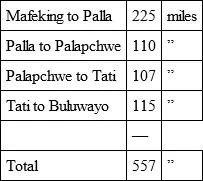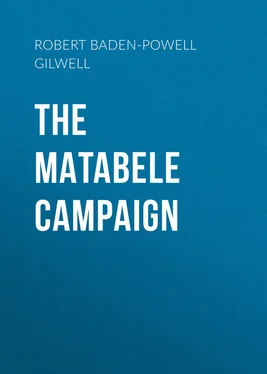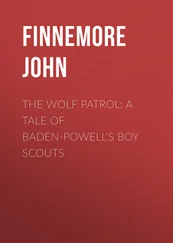Robert Baden-Powell of Gilwell - The Matabele Campaign
Здесь есть возможность читать онлайн «Robert Baden-Powell of Gilwell - The Matabele Campaign» — ознакомительный отрывок электронной книги совершенно бесплатно, а после прочтения отрывка купить полную версию. В некоторых случаях можно слушать аудио, скачать через торрент в формате fb2 и присутствует краткое содержание. Жанр: foreign_antique, foreign_prose, на английском языке. Описание произведения, (предисловие) а так же отзывы посетителей доступны на портале библиотеки ЛибКат.
- Название:The Matabele Campaign
- Автор:
- Жанр:
- Год:неизвестен
- ISBN:нет данных
- Рейтинг книги:5 / 5. Голосов: 1
-
Избранное:Добавить в избранное
- Отзывы:
-
Ваша оценка:
- 100
- 1
- 2
- 3
- 4
- 5
The Matabele Campaign: краткое содержание, описание и аннотация
Предлагаем к чтению аннотацию, описание, краткое содержание или предисловие (зависит от того, что написал сам автор книги «The Matabele Campaign»). Если вы не нашли необходимую информацию о книге — напишите в комментариях, мы постараемся отыскать её.
The Matabele Campaign — читать онлайн ознакомительный отрывок
Ниже представлен текст книги, разбитый по страницам. Система сохранения места последней прочитанной страницы, позволяет с удобством читать онлайн бесплатно книгу «The Matabele Campaign», без необходимости каждый раз заново искать на чём Вы остановились. Поставьте закладку, и сможете в любой момент перейти на страницу, на которой закончили чтение.
Интервал:
Закладка:
25th May. – Struggling on with weak mules to Gaberones (18 miles in 51/2 hours) And on again. Every mile now began to show the grisly, stinking signs of rinderpest. Dead oxen varied occasionally with dead mules – the variety did not affect the smell — that remained the same. Occasionally we passed a waggon abandoned owing to the loss of animals.
The road at times was hard, but generally soft red sand. The scenery had a sameness of level, white, grass land and thorn–bush.
Reached a big kraal (Matchudi’s) of 700 inhabitants, at midnight. Deep sandy road. It took our fresh (!) team over half an hour to get us outside the village. Our pace was now so slow, and the whacking of the whip so painful merely to listen to (happily, the mules don’t seem to feel it half so much as we), that we did much of the journey walking on ahead. Sun baking hot, and flies as thick as dust, and that was bad.
27th May. – By walking with a gun we managed to get a good supply of partridges and guinea–fowl as we went along. To–day we passed the downward coach, in which was Scott–Montague, M.P. He gave us lots of information; and we felt we were not having the worst of the journey, when we saw him packed in with twelve other “insides,” one of whom a woman, and another her baby, which wasn’t very well!
Reached Pala – a group of stores – at midnight. Here were collected some two hundred waggons, stopped by loss of all their oxen from rinderpest. Three thousand two hundred beasts dead at this one place!
28th May. – We trekked along all day. Bush country; lots of partridges. One of our mules died on the road. Passed through Captain Lugard’s camp about 11 p. m. Only Hicks, his manager, awake. He had thirteen waggons, and nearly two hundred mules and donkeys. He is taking an exploring expedition of eleven white men to the Lake N’Gami district, prepared to remain away two years if necessary.
29th May. – Outspanned, 4.30 a. m., and had our first wash since starting, in liquid mud from water–holes. The road was now through heavy sand. We walked over 20 miles of our journey on foot.
Reached Palapchwe (Khama’s capital) at midnight.
Found a dozen telegrams awaiting us, describing fights round Buluwayo, such as put some hopes into us again.
Here we slept in beds!
30th May. – Before breakfast, who should stroll in, all by himself, but Khama! Thin, alert, and looking quite young, in European clothes.
He had not much to say. He knew me as George’s brother, and asked about the baby niece.
His town is certainly well–ordered, and he manages everything himself.
There are three or four European stores; otherwise the town is an agglomeration of kraals, and thus stands in several sections, each under its own headman. It is situated on an undercliff of a bush–grown ridge; is fairly well supplied with water; and commands a splendid view over 100 miles of country. Khama had moved his people here only a few years ago, from Shoshong, which used to be his capital farther west. He rules his country effectively. No liquor may be sold, even among white men; and all along the road while in his country we found the rinderpest carcasses had been burned.
But he might with advantage do something for the road. Leaving Palapchwe at 10 a. m., we bumped and jolted down the stony hill in a manner calculated to mash up not only the coach and its insides, but their insides as well. Any person or persons afflicted with liver should go and live a week at Palapchwe, and drive down this hill daily – once a day would be enough!
And then beyond – across the plains, grown with mopani bush – the road was all deep sand. We merely crept along. But still we had broken the back of our journey —

A certain sameness of scenery and want of water all the time, but compensated for by the splendid climate, the starry nights, and the “flannel–shirt” life generally.
Every one of the few wayfarers, in waggons or otherwise, along the road is interesting, either as a hunter, gentleman–labourer, or enterprising trader. They all look much the same: Boer hat, flannel shirt, and breeches – so sunburnt that it is hard at first to tell whether the man is English, half–caste, or light Kaffir.
One we met to–day, creeping along with a crazy, two–wheeled cart drawn by four donkeys. He himself had only been two months in South Africa: came from Brighton. Heard that food and drink were at a premium in Buluwayo; so had loaded up this drop–in–the–ocean of a cargo of meal and champagne, and was steadily plodding along with it to make his fortune. We lightened his load by two pints, and weightened his pocket with two pounds. And we afterwards heard he sold his whole consignment at a very good profit long before he got to Matabeleland.
31st May. – All day and all night we go rocking and pitching, rolling and “scending” along in the creaking, groaning old coach: just exactly like being in the cabin of a small yacht in bad weather – and the occasional sharp swish of the thorn–bushes along the sides and leathern curtains sounds just like angry seas. Then frequently she heels over to a very jumpy angle, as if a squall had struck her. One of these days the old thing will go over.
Strange that in all this endless, uninhabited, and bushy wilderness there is scarcely any game.
We carry our own food, chiefly tinned things, with us, and at convenient outspans (when we are changing mules) we boil our kettle and have a meal of sorts and thoroughly enjoy it – especially the evening meal, under the stars.
1st June. – Reached Tati Gold Fields, 1 a. m. A collection of three or four tin stores, one of them an hotel, where we rolled into bed for a short rest.
We breakfasted with Mr. Vigers, the Resident Commissioner. Tati is a British Protectorate of older standing than the Chartered Company, and independent of it. It has its own administrative machinery, – a mining population of whites and blacks and “wasters,” and yet not a single policeman! “Wasters?” – oh, it’s a South African word, and most expressive; applies to the specious loafer who is so common in this country, – the country teems with him in high grades as well as low, hinc multæ lacrimæ in the history of South African enterprises.
Twenty miles beyond Tati we crossed the dry bed of the Ramakan River, the border of Matabeleland. Close by the river stands the ruin of a “prehistoric” fort, built of trimmed stones. There are several similar forts about the country, offshoots of the famed Zimbabye ruins near Victoria.
We nearly killed our General to–day in crossing a dry river bed. The descent into the drift was so steep that the wheelers could not hold back the coach, so our drivers sent them down it at a gallop. Half–way down there was a sill of rock off which the coach took a flying leap into the sand below. We inside were chucked about like peanuts in a pot, and Sir Frederick was thrown against the roof and his head and neck were stiff for some time afterward.
Had dinner (!) at a roadside shanty “Hotel,” where the waiter smoked while he served us.
2nd June. – Signs of war and of colonisation at last. We reached Mangwe, 6.30 a. m. An earthwork fort with a waggon encampment outside it. In this laager were all the women and children, chiefly Dutch, from farms around; the men acting as garrison under command of Van Rooyen and Lee, – two well–known hunters, who were here in Lobengula’s time.
In the fort they showed with pride some half a dozen Matabele prisoners they had captured in a fight. I looked well at them, fearing that they might be the only enemy that I should see. Happily I might have spared my eyes.
Читать дальшеИнтервал:
Закладка:
Похожие книги на «The Matabele Campaign»
Представляем Вашему вниманию похожие книги на «The Matabele Campaign» списком для выбора. Мы отобрали схожую по названию и смыслу литературу в надежде предоставить читателям больше вариантов отыскать новые, интересные, ещё непрочитанные произведения.
Обсуждение, отзывы о книге «The Matabele Campaign» и просто собственные мнения читателей. Оставьте ваши комментарии, напишите, что Вы думаете о произведении, его смысле или главных героях. Укажите что конкретно понравилось, а что нет, и почему Вы так считаете.












